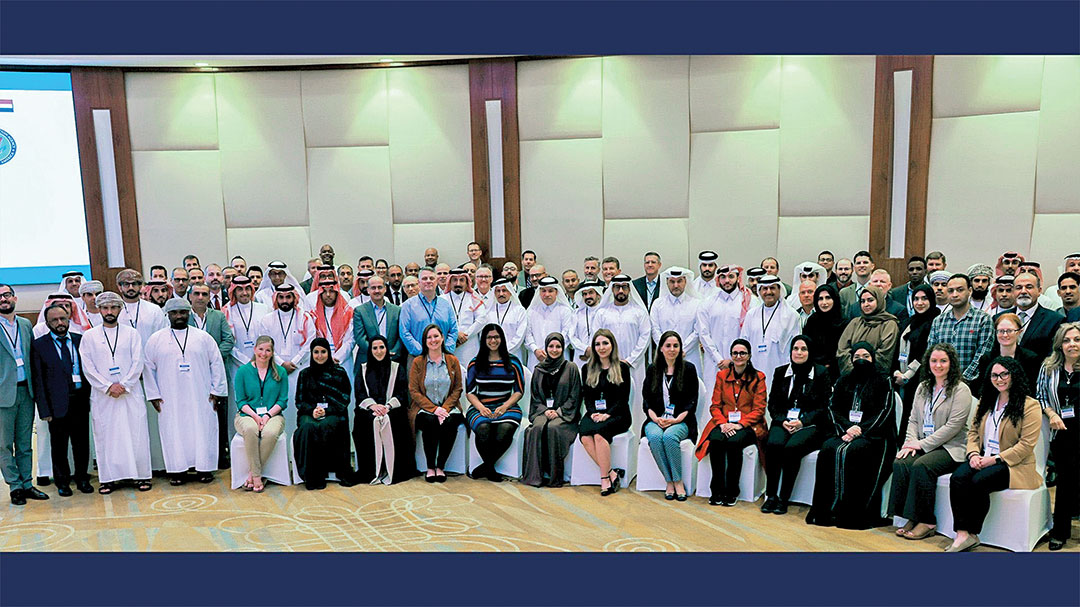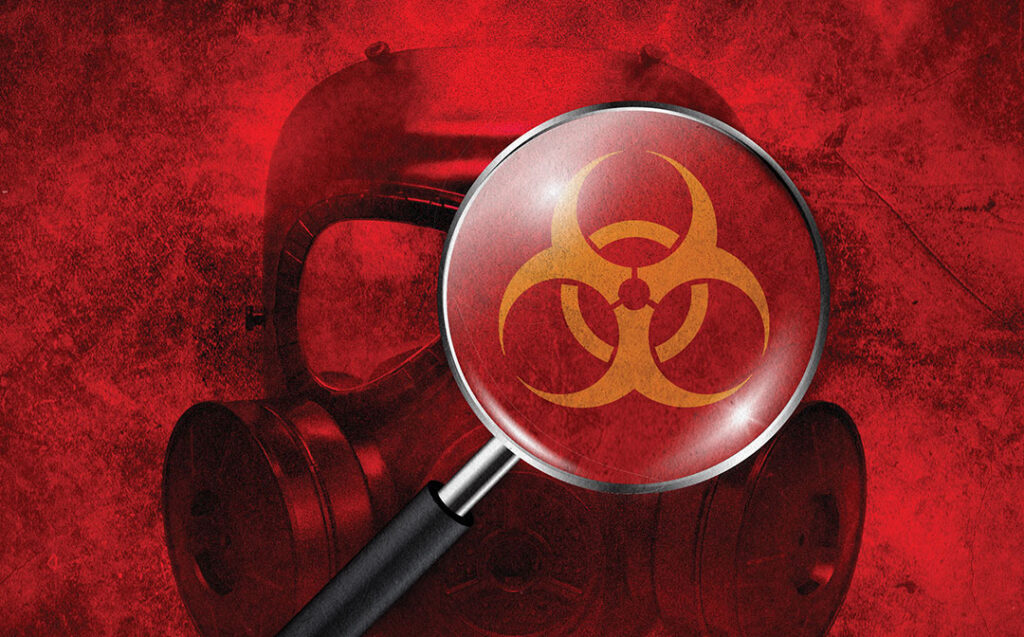While friendly nations work to prevent dual-use materials from falling into the wrong hands, terrorist groups are jockeying to acquire chemical, biological and radioactive weapons. COVID-19 sounded global alarms about the dangers of pandemic outbreaks, whether the result of animal-to-human transmission or a leak of dangerous materials from a lab terrorists and other adversaries can exploit to make biological weapons.
With these challenges in mind, the U.S. Department of Defense Threat Reduction Agency’s Biological Threat Reduction Program, in coordination with United States Central Command, hosted the Regional Countering Weapons of Mass Destruction Symposium. More than 75 guests, primarily military and security specialists in the fields of health and epidemiology representing regional states and international health organizations, attended the symposium held in Bahrain in May 2024.
The goal was to gather policymakers from the Ministries of Defense, Health and Agriculture as well as other relevant sectors and technical experts in the fields of health safety, biological monitoring and risk management to exchange ideas and identify best practices for combating threats. The symposium focused on attracting specialists from the civilian and military sectors, academia, and biotech representatives as well as experts from chemical, biological, radiological, nuclear and explosive materials response teams. It also highlighted ways to protect the health of troops and emergency operations and crisis management centers.
The symposium’s objectives centered on increasing the knowledge of participants and their ability to develop policies and strategies domestically and regionally, as well as via the international community, to combat biological threats and strengthen global health security. The forum also encouraged discussion between civilian and military representatives, facilitating the exchange of ideas, establishing partnerships and building trust to increase opportunities for cooperation when confronting regional biosecurity challenges. This includes coordinating and participating in future training exercises, exchanging information, and strengthening partnerships with the U.S. and partner countries.

Symposium sessions produced fruitful discussions between experts and the delegations of participating countries. The Yemeni panel discussed military medical services and supply chain security and response in Yemen. Experts from the Sultanate of Oman examined the importance of multisourcing and the need to diversify international sources of medications and vaccines to maximize benefits and protect the public from manufacturers who leverage crises to increase the price of vaccines.
The Jordanian delegation spoke about the role of its Armed Forces in working with other state agencies to slow the spread of the pandemic as well as the equally difficult challenge of combating misinformation. This is why countries must go to great lengths to educate their populations about how to avert the next pandemic, prepare the public for prevention, and alert them to the dangers of malicious gossip and misinformation that weaken public security, Jordanians said. The delegation also discussed Jordan’s unique experience setting up the National Center for Epidemics and Communicable Diseases Control to fill gaps that emerged between the country’s security and health organizations during the pandemic.
Recognizing that some countries might seek to avoid disclosure to spare themselves political embarrassment, experts from Oman highlighted the importance of transparency when announcing the discovery of epidemic disease or leaks of hazardous materials. Full disclosure is the best way to protect the region and world at large and to prevent their spread. A failure to do so can have disastrous consequences as the disease spreads to nearby countries. The Omani panel suggested employing modern technologies to avoid problems caused by nondisclosure.
“We rely on the official data we receive from other nations, and based on that, we take preventative action. If that data is not accurate or transparent there is a risk the outbreak will spread to everyone,” one Omani said. “We were all struck a painful blow with the COVID-19 pandemic, which may have been caused by ignoring and failing to disclose case numbers. We must therefore think outside the box.
“There is no international agreement at present that makes reporting mandatory and there are no consequences for not reporting. We must then employ advanced technologies, like AI, for detection and more accurate results. I believe that health intelligence can play an important role in this regard.”
The Omanis also emphasized the importance of countries’ participation in and application of the International Health Regulations agreement to avert disasters from the spread of epidemic disease or hazardous material leaks.
The delegation highlighted the importance of amending international agreements to ban biological weapons and of requiring countries to implement these bans. Without compulsion or international deterrence such agreements will have no effect.
“Oman was one of the first to sign the Convention on the Prohibition of Biological Weapons. Most countries have, of course, signed this agreement, but, unfortunately, there is a weakness in its application,” the Omani representative said. “The risks of bioweapons know no bounds. No one is safe from this threat.”
The Qatari delegation agreed with the Omani’s proposal not to punish countries that transparently and honestly disclose outbreaks, because such leniency will limit the spread of epidemic disease and help unite international backing to provide support and assistance. If, on the other hand, the response from neighboring and distant countries is negative, such as suspending flights or not accepting citizens from affected countries and severing business ties, countries will be hesitant to disclose health data, exposing everyone to the risks of infection and enormous loss.
“A good example is what happened during the COVID-19 pandemic, where countries were classified as red, orange, or green, which translated to a form of punishment for countries that honestly declared the outbreak of the epidemic,” Qatar’s representative said. “This unfortunately caused some countries to shy away from truthful disclosures. If we aspire to obtain accurate data and to encourage countries to speak out in complete transparency, then we should not take action against those countries that do.”
The Bahraini delegation brought up public fears about adverse vaccine effects, conspiracy theories and a failure to educate the public, and emphasized the importance of sharing statistics related to vaccine results. It also encouraged international cooperation between government and international organizations in the event of a hazardous materials leak, terrorist attack or pandemic outbreak in a given area.
A prime example of just such cooperation is the world’s rush to support Sierra Leone during the hemorrhagic fever outbreak, limiting its spread; however, the rapid spread of COVID-19 did not give the world time to confine the epidemic to a specific region.
The Yemeni military delegation expressed satisfaction with the communication and work achieved between government institutions and the Armed Forces, as work is being done among the Ministries of Education, Health, Defense and Agriculture to limit the spread of malaria. Some governorates in Yemen have limited entry to control the epidemic.
Yemen’s civil war, long coastline, mountainous terrain and proximity to disease centers in Africa
have all played havoc with the country’s ability to control outbreaks.
“The civil war in Yemen has greatly impacted the economic and security aspect and caused a divide in health institutions, where upper management is located in the capital, Sanaa, away from affected areas. We have, however, noticed improvement over the past two years in the timeliness of the government’s response.
“During the COVID-19 pandemic there was coordination across all levels of the state, between the presidency and governors and military units. In each military unit we have a chemical unit that tracks epidemics, biological and chemical threats. There are also, of course, viruses that come via illegal immigrants from the African coast that necessitate provisions to control territorial waters, monitor ship crews, and to examine all materials coming through the ports.”
The Jordanian delegation shared lessons learned from the COVID-19 pandemic: the establishment of the National Center for Epidemics and Communicable Diseases Control, also known as the Jordan Center
for Disease Control.
“The gap that appeared in every event was a weakness in coordination and cooperation between different sectors and institutions. The roles between the institutions were not clear enough, which led to overlap, duplication and redundancy. It adversely affected the speed of an effective response to critical situations and had negative consequences with the loss of many lives and waste,” a Jordanian said.
Royal directives were issued to establish the National Center as the first official government body concerned with public health and strengthening national capabilities to detect health threats while preparing to combat and prevent them.
Over three days of the Countering Weapons of Mass Destruction Symposium, participants exchanged field experiences and COVID success stories with their counterparts, including the steps followed in prevention, detection, reporting and response to biological risks and epidemics. Biosecurity, biosafety and biological monitoring were discussed as well as pandemic detection, diagnosis and leveraging emerging technologies and international cooperation to reduce threats. This type of threat cannot be confronted by any one country alone; it requires international partnerships.

